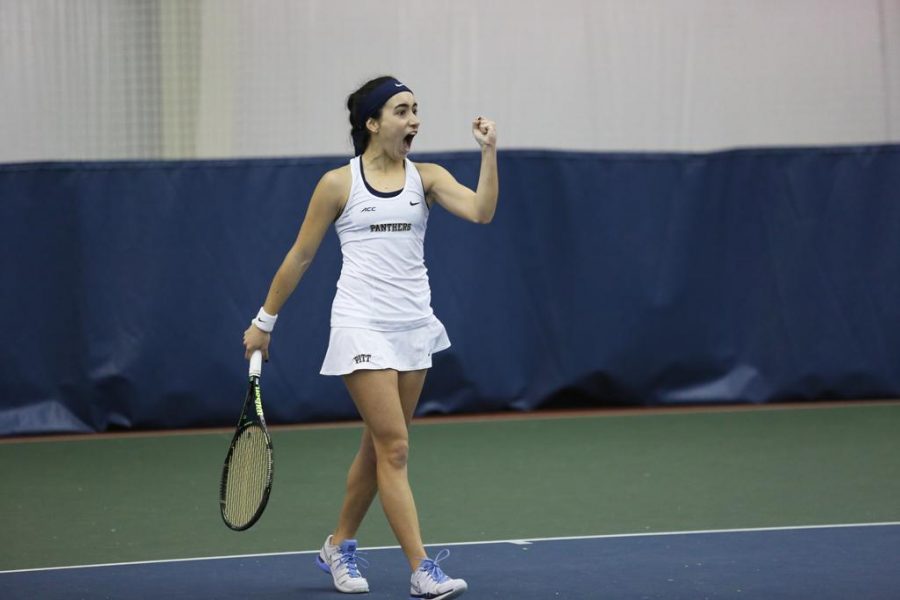Pitt tennis coach Alex Santos has a simple recruiting philosophy: He wants the best tennis players, regardless of where they come from.
This philosophy took him to Tokyo, Hong Kong, Brazil and Spain to find his recruiting class, which now consists of first-years Natsumi Okamoto, Carina Ma, Gabriela Rezende and Clara Lucas. The four newcomers have combined for a 46-50 record, with Ma being the most successful at 16-10, adjusting to a higher level of competition and a new country.
“A lot of things are happening at the same time. Going away, leaving their parents, their friends,” Santos said. “I think they’ve done a great job adapting overall.”
Santos’ relationship with each player began with an email or phone call, thanks to international acquaintances he’s made. He and his staff will often receive an email or call from a player or coach, which helps him hone in on specific players.
From there, he’ll make a concerted effort to scout the players as best as he can, a difficult task given the distance. He tries to see them in person if possible. He traveled internationally to see three of the four players in his first-year class.
“We are very proactive in making sure we make an educated decision,” Santos said.
Eventually, he brings each player on campus for a recruiting visit and gives them a tour in hopes of securing a commitment. For Rezende, a native of Curitiba, Brazil, she knew Pitt would be her choice once she stepped on campus, picking the Panthers over Brigham Young University and University of Nevada, Reno.
“I came on my official visit and just felt like like this was the place,” Rezende said. “I really liked the facilities, the structure.”
Though switching countries seems difficult travel-wise, Santos said that isn’t always the case. Typically, international players travel regularly for tournaments during their pre-college years.
“All of these girls are used to traveling a lot, so they’re like citizens of the world,” Santos said.
For Okamoto, the transition has been especially seamless. In search of higher-level tennis competition and instruction, she moved from Tokyo to Spain for her last three years of high school. The move afforded her the ability to play matches in surrounding European countries, instead of just in Tokyo.
“It’s almost natural because I moved before,” Okamoto said.
Of the four, Lucas is the least seasoned traveler, which she said has made the move to the United States tougher for her.
Lucas, who is from Spain, said she knew very little English when she moved to Pittsburgh in the summer. She knew some from preparing for the SATs, but rarely spoke it.
“When I came here nobody spoke Spanish. It was pretty difficult,” Lucas said.
Okamoto moved in earlier to have more time to adjust, and also tries to speak with Lucas in Spanish from what she learned during her own stay in Spain.
On the court, the level of tennis in the ACC is much higher than what any newcomer has experienced. For international players, the gap is smaller, as they’re used to playing in high-level competitions across various countries.
“They came in with regimens that have helped them to adapt faster and better to their conditions,” Santos said.
Still, the jump in play has come as a bit of shock for Lucas, as the margin for error is miniscule in matches.
“[My opponents] don’t miss one ball. They are so tough mentally and physically,” Lucas said.
As the season has continued, Santos said the four newcomers have progressed, continuing to adapt and improve their skills.
“They came with their minds open,” Santos said. “They have been improving a lot and competing very well.”
Off the court, they’ve met varying levels of homesickness. Ma, a Hong Kong native, and Rezende both said they miss the food from back home. For Rezende, it’s hard for her to get her Brazilian food fix, and said she’s yet to visit Pittsburgh restaurant Texas de Brazil.
Of course, they miss more than the food, also thinking of their families and pets. Rezende especially is anxious to see her dog, which she got four days before moving to Pittsburgh, when she goes back to Brazil for the summer.
Though the longing to go back home has been tough to deal with at times, Rezende said she and her fellow first years have close relationships, which helps ease any creeping homesickness and culture shock.
“We’re kind of going through the same situation, the same difficulties,” Rezende said.
Santos also stresses that he’s always there for his players, a promise he makes to a player’s parents during the recruiting process.
“We are here for them no matter how hard the situation is, the time of the day, the day of the week, it doesn’t matter,” Santos said. “They always feel that they can have someone they can rely on.”
The upperclassmen — three of four of whom are American — have also helped in “showing them the ropes and being there whenever they need them,” Santos said.
In moments when he sees the young and old, the foreign and the local working together, he can’t help but smile.
“That’s pretty cool to see the international players and domestic players helping each other and learning from each other,” Santos said.



